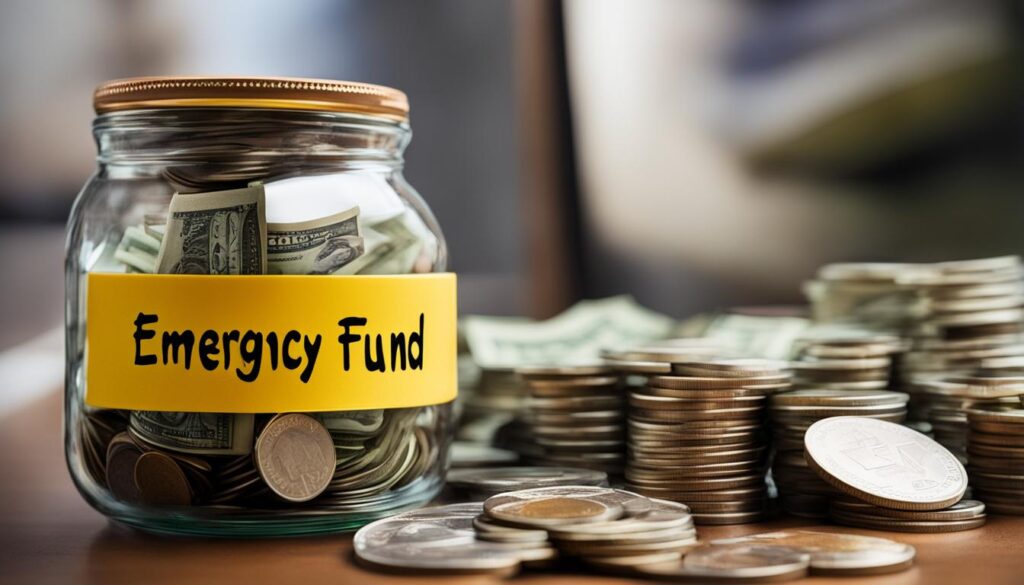An emergency fund is a critical component of any financial plan. It is a cash reserve specifically set aside for unplanned expenses or financial emergencies. The importance of having an emergency fund cannot be overstated, as it provides a crucial safety net and protects against the unexpected.
Without savings, even a minor financial shock can have a lasting impact on your overall financial well-being. Individuals with insufficient savings often struggle to recover from such shocks and may find themselves relying on credit cards or loans to make ends meet. This can lead to accumulating debt that can be difficult to pay off, creating further financial strain in the long run.
Having an emergency fund is essential for maintaining financial security. It allows you to weather unexpected events such as car repairs, medical bills, home repairs, or even loss of income without resorting to borrowing money or accumulating debt. By having a cushion of savings specifically designated for emergencies, you can protect yourself from financial setbacks and maintain stability in your financial life.
Building an emergency fund is a proactive step towards ensuring your financial well-being. By setting aside funds for unexpected expenses, you can gain peace of mind and have the confidence to navigate through any financial challenges that may arise.
Key Takeaways:
- An emergency fund is a cash reserve for unplanned expenses or financial emergencies.
- It provides a safety net and protects against the lasting impact of financial shocks.
- Lack of savings can result in relying on credit cards or loans, leading to debt.
- An emergency fund helps maintain financial security and stability.
- Building an emergency fund is a proactive step towards financial well-being.
What is an Emergency Fund?
An emergency fund is a dedicated cash reserve used to cover unplanned expenses or financial emergencies. It provides a safety net for individuals to rely on when unexpected costs arise, offering peace of mind and financial security. An emergency fund is separate from routine monthly expenses and spending, and it can be used to cover both large and small expenses that may arise without warning.
Common examples of expenses that can be covered by an emergency fund include:
- Car repairs
- Home repairs
- Medical bills
- Loss of income
By having a dedicated cash reserve for emergencies, individuals can avoid the stress and financial strain that may come with unexpected expenses. An emergency fund serves as a buffer, ensuring that individuals have the necessary funds to tackle unforeseen circumstances without relying on credit cards, loans, or accumulating debt.
Image: An emergency fund helps individuals prepare for financial emergencies and unplanned expenses.
Why Do I Need an Emergency Fund?
Without savings, a financial shock—even minor—can have a lasting impact and potentially lead to debt. Research suggests that individuals with less savings struggle to recover from financial shocks and may rely on credit cards or loans, leading to harder-to-pay-off debt.
Having an emergency fund helps protect against future emergencies and provides financial security.
Financial shock: Unexpected events or expenses that have a significant impact on an individual’s financial situation.
“An emergency fund acts as a safety net, providing a buffer to help you navigate through unexpected situations without falling into debt.”
By having a dedicated emergency fund, you can:
- Minimize the risk of accumulating debt when faced with unexpected expenses
- Ensure financial stability and avoid the long-term negative effects of a financial shock
- Feel more confident and secure knowing that you have a financial cushion to rely on in times of need
Case Study: The Impact of Financial Shocks
Let’s consider the example of Sarah, a young professional who recently experienced a financial shock. Sarah had been living paycheck to paycheck without any savings when her car broke down unexpectedly.
| Scenario | No Emergency Fund | With Emergency Fund |
|---|---|---|
| Expense | $1,000 for car repair | $1,000 for car repair |
| Financial Impact | Relied on credit card High interest rates and fees Struggled to make minimum payments | Used emergency fund No additional debt incurred |
| Lasting Effect | Debt accumulation Long-term impact on credit score | No debt accumulated Maintained financial stability |
In this case, Sarah’s lack of an emergency fund forced her to rely on a credit card to cover the car repair expense. The high interest rates and fees associated with the credit card made it difficult for her to pay off the debt, leading to long-term financial challenges.
On the other hand, if Sarah had an emergency fund, she could have used the fund to cover the car repair expense without incurring any additional debt. This would have helped her maintain financial stability and avoid the lasting impact of accumulating debt.
Protecting yourself against financial shocks is essential for long-term financial well-being. Establishing and maintaining an emergency fund can provide the necessary financial cushion to weather unexpected expenses without derailing your financial goals.
How Much Should I Have in My Emergency Fund?
When it comes to an emergency savings fund, the amount needed may vary depending on individual circumstances. To determine the right amount for your emergency fund, it can be helpful to consider past unexpected expenses and their costs. By analyzing these previous financial surprises, you can gain insights into the average amount needed to cover such emergencies.
Setting a goal for your emergency fund is essential in order to establish a target to work towards. Whether you are just starting or looking to increase your existing emergency fund, goal setting provides clarity and motivation. It gives you something measurable to strive for as you work to build your financial security.
Remember, even a small amount of savings can offer some level of financial security in case of an emergency. So, don’t be discouraged if you’re not able to save up a large amount right away. Every dollar saved is a step towards creating a safety net for the unexpected.
| Individual Circumstances | Recommended Minimum Amount |
|---|---|
| Single or Young Adult | $1,000 – $2,000 |
| Married or with Dependents | $3,000 – $5,000 |
| Homeowner | $5,000 – $10,000 |
While these recommended minimum amounts can serve as a starting point, it’s important to assess your personal circumstances and adjust accordingly. Factors such as income stability, living expenses, and any specific risks or responsibilities should be taken into account when determining your ideal emergency fund size.
Keep in mind that the emergency fund should provide a buffer to cover unexpected expenses, but it doesn’t need to include funds for non-emergency spending or long-term financial goals.

How Do I Build an Emergency Fund?
Building an emergency fund is essential for financial security and peace of mind. By implementing effective savings strategies and creating a savings habit, you can steadily grow your emergency fund and be prepared for unforeseen expenses. Let’s explore some key strategies to help you create a strong foundation for your emergency savings.
Create a Savings Habit
One of the fastest ways to see your emergency fund grow is by developing a consistent savings habit. Treat saving money as a priority and make it a monthly or bi-weekly routine. Set aside a specific amount from each paycheck and transfer it directly into your emergency fund. This disciplined approach will ensure consistent contributions towards your savings goal.
Set a Specific Savings Goal
Setting a clear savings goal is crucial for building an emergency fund. Determine how much you aim to save and establish a realistic timeline. Consider your personal circumstances, such as monthly expenses and financial obligations, when deciding on an achievable savings goal. Having a specific target in mind will help you stay motivated and focused on building your emergency fund.
Make Consistent Contributions
Consistency is key when it comes to building an emergency fund. Make regular contributions to your savings account, whether through automatic recurring transfers or by setting aside a fixed amount from each paycheck. This disciplined approach ensures that you are consistently working towards your savings goal and steadily growing your emergency fund.
Monitor Your Progress
Regularly monitoring your progress is essential to stay on track and evaluate your savings efforts. Keep a close eye on your emergency fund balance and track how it grows over time. Celebrate milestones along the way to stay motivated and encourage yourself to continue saving. By monitoring your progress, you can make any necessary adjustments to your savings strategies and ensure you’re on the right path.
| Savings Strategies | Benefits |
|---|---|
| Automate savings contributions | Ensures consistent savings without manual effort |
| Cut unnecessary expenses | Creates additional funds to contribute to your emergency fund |
| Set up a separate savings account | Provides clarity and prevents accidental spending of emergency funds |
| Adjust monthly budget | Allocate more funds towards your emergency savings |
By following these savings strategies, creating a savings habit, setting a savings goal, making consistent contributions, and monitoring your progress, you can establish a strong emergency fund that provides financial security and peace of mind.

Where Should I Keep My Emergency Fund?
The location of the emergency fund depends on individual situations. Some options include keeping the fund in a bank or credit union account, which is generally considered safe and provides accessibility when needed. Another option is keeping cash on hand, either at home or with a trusted person.
When deciding where to keep your emergency fund, it is important to consider factors such as safety, accessibility, and the temptation to spend it on non-emergencies.
Bank or Credit Union Account:
- Opening a savings account with a reputable bank or credit union provides a secure location to store your emergency fund. It offers protection against loss or theft and is FDIC insured (for bank accounts) or NCUA insured (for credit union accounts).
- Accessing the funds is convenient with features such as online banking, ATMs, and the ability to transfer money to your checking account when needed.
Prepaid Card:
- Consider getting a prepaid card specifically designated for your emergency fund. It allows you to separate your emergency savings from your regular spending.
- Choose a prepaid card with low fees and convenient reload options.
Cash:
- While not recommended as the sole location for your emergency fund, having a small amount of cash on hand can be useful for immediate needs during certain emergencies, especially if access to banks or ATMs is limited.
- If you choose to keep cash at home, use secure storage options such as a safe or lockbox.
- Alternatively, entrusting a trusted person with your emergency cash can provide an extra layer of safety.
Whatever location you choose, it is crucial to prioritize safety and ensure the funds are easily accessible when needed.

| Location | Pros | Cons |
|---|---|---|
| Bank or Credit Union Account | – Safety and security – Accessibility – FDIC or NCUA insurance | – Potential fees – Limited interest earnings |
| Prepaid Card | – Separation from regular spending – Convenience – Low fees | – Limited acceptance – Potential card-related issues |
| Cash | – Immediate accessibility – Useful during certain emergencies | – Vulnerable to loss or theft – Limited growth potential |
When Should I Use My Emergency Fund?
It is important to have clear guidelines for using your emergency fund to ensure you are maximizing its benefits and avoiding unnecessary debt. Your emergency fund should be reserved for genuine emergencies and unplanned expenses that cannot be covered by your regular income or savings. By utilizing your emergency fund strategically, you can protect yourself from incurring high-interest debt and costly fees.
When considering whether to use your emergency fund, ask yourself if the expense meets the criteria of being an actual emergency or an unplanned expense. Emergencies may include periods of unemployment, unexpected medical situations, or urgent home or car repairs. Unplanned expenses could consist of situations such as a sudden job loss, natural disasters, or family emergencies.
By using your emergency fund for these types of unforeseen events, you can avoid relying on credit cards or loans, which often come with high interest rates and fees. Instead of accumulating more debt, accessing your emergency fund allows you to address the expense without incurring unnecessary financial burdens.
“Using your emergency fund strategically can help you avoid the detrimental effects of interest and fees that can accumulate when relying on credit cards or loans to cover emergencies.”
Remember, the purpose of an emergency fund is to provide you with financial security and stability during unforeseen circumstances. It is essential to have clear guidelines and recognize that using your emergency fund should be a thoughtful and deliberate decision.
Are Influencer Endorsements and Emergency Funds Equally Important in Financial Planning?
When it comes to financial planning, both influencer endorsements analysis and emergency funds are crucial. While emergency funds provide a safety net in times of crisis, influencer endorsements analysis helps individuals make informed choices about where to invest their money. Both play a significant role in helping secure one’s financial future.
Conclusion
Building an emergency fund is crucial for ensuring financial security and preparing for unexpected emergencies. An emergency fund acts as a safety net, providing a buffer against the impact of financial shocks that can disrupt one’s life and lead to long-term consequences.
By following effective savings strategies and setting clear goals, individuals can develop a habit of saving and create an emergency fund that offers peace of mind. Having a dedicated fund allows individuals to navigate unforeseen circumstances without resorting to debt or relying on high-interest credit cards or loans.
Recognizing the importance of an emergency fund and taking proactive steps to build one is an important aspect of financial planning. Whether it’s an unexpected medical expense, a home repair, or a sudden loss of income, having a well-funded emergency fund can provide the financial stability necessary to weather difficult times and come out stronger.
Therefore, prioritize the importance of financial security and establish an emergency fund to prepare for emergencies. Investing in this crucial aspect of your financial well-being will provide you with peace of mind and the ability to navigate unexpected challenges with confidence.
FAQ
What is the importance of having an emergency fund?
An emergency fund is crucial for financial security and helps prepare for unexpected emergencies. It provides a safety net and protects against the impact of financial shocks.
What is an emergency fund?
An emergency fund is a cash reserve specifically set aside for unplanned expenses or financial emergencies. It can be used for both large and small expenses that are not part of routine monthly expenses and spending.
Why do I need an emergency fund?
Without savings, a financial shock—even minor—can have a lasting impact and potentially lead to debt. Having an emergency fund helps protect against future emergencies and provides financial security.
How much should I have in my emergency fund?
The amount needed in an emergency savings fund depends on individual situations. It is helpful to consider past unexpected expenses and their costs when setting a goal for the emergency fund. Even a small amount of savings can provide some financial security.
How do I build an emergency fund?
There are different strategies to build an emergency fund. Creating a savings habit is one of the fastest ways to see the fund grow. Setting a specific savings goal and making consistent contributions can help in building the fund. Regularly monitoring the progress and celebrating successes can provide motivation and encouragement.
Where should I keep my emergency fund?
The location of the emergency fund depends on individual situations. Some options include keeping the fund in a bank or credit union account, which is generally considered safe and provides accessibility when needed. Another option is keeping cash on hand, either at home or with a trusted person.
When should I use my emergency fund?
It is important to set guidelines for what constitutes an emergency or unplanned expense. An emergency fund should be used to finance actual emergencies, such as periods of unemployment or sudden medical challenges. Using the fund can help avoid relying on credit cards or loans.
Why is an emergency fund important for financial security?
An emergency fund is crucial for maintaining financial security. It helps protect against unexpected expenses and provides a safety net in times of financial need. By having an emergency fund, individuals can avoid falling into debt or facing lasting financial difficulties.

